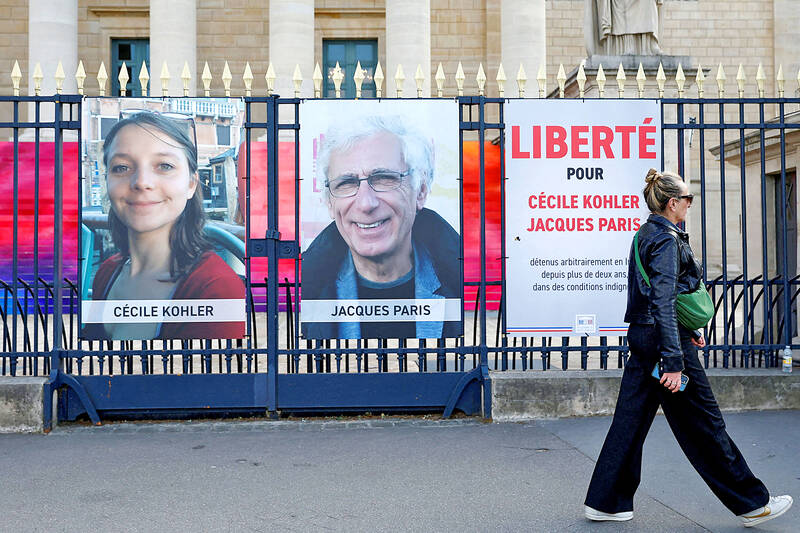Paris has filed a case against Tehran at the top UN court over two French citizens who have been held in Iran for three years, French Minister for Europe and Foreign Affairs Jean-Noel Barrot said yesterday.
The announcement comes as Iranian negotiators met with their counterparts from the UK, France and Germany in Turkey yesterday for talks on Iran’s nuclear program.
Cecile Kohler, a 40-year-old literature teacher from eastern France, and her partner Jacques Paris, in his 70s, were arrested on May 7, 2022, on the last day of a tourist trip to Iran. They have been held on spying charges, which they have vehemently denied.

Photo: Reuters
In its case at the International Court of Justice (ICJ), France accused Iran “of violating its obligation to provide consular protection” to the pair, who “have been held hostage... detained in appaling conditions that amount to torture,” Barrot told France 2 television.
They are among a number of Europeans still held by Iran in what some European countries, including France, regard as a deliberate strategy of hostage-taking to extract concessions from the West at a time of tension over the Islamic republic’s nuclear program.
Kohler and Paris are the last known French detainees in Iran after some recent releases and are regarded as “state hostages” by the French government.
The two are jailed in extremely tough conditions, according to their families.

‘ABUSE OF POWER’: Lee Chun-yi allegedly used a Control Yuan vehicle to transport his dog to a pet grooming salon and take his wife to restaurants, media reports said Control Yuan Secretary-General Lee Chun-yi (李俊俋) resigned on Sunday night, admitting that he had misused a government vehicle, as reported by the media. Control Yuan Vice President Lee Hung-chun (李鴻鈞) yesterday apologized to the public over the issue. The watchdog body would follow up on similar accusations made by the Chinese Nationalist Party (KMT) and would investigate the alleged misuse of government vehicles by three other Control Yuan members: Su Li-chiung (蘇麗瓊), Lin Yu-jung (林郁容) and Wang Jung-chang (王榮璋), Lee Hung-chun said. Lee Chun-yi in a statement apologized for using a Control Yuan vehicle to transport his dog to a

Taiwan yesterday denied Chinese allegations that its military was behind a cyberattack on a technology company in Guangzhou, after city authorities issued warrants for 20 suspects. The Guangzhou Municipal Public Security Bureau earlier yesterday issued warrants for 20 people it identified as members of the Information, Communications and Electronic Force Command (ICEFCOM). The bureau alleged they were behind a May 20 cyberattack targeting the backend system of a self-service facility at the company. “ICEFCOM, under Taiwan’s ruling Democratic Progressive Party, directed the illegal attack,” the warrant says. The bureau placed a bounty of 10,000 yuan (US$1,392) on each of the 20 people named in

The High Court yesterday found a New Taipei City woman guilty of charges related to helping Beijing secure surrender agreements from military service members. Lee Huei-hsin (李慧馨) was sentenced to six years and eight months in prison for breaching the National Security Act (國家安全法), making illegal compacts with government employees and bribery, the court said. The verdict is final. Lee, the manager of a temple in the city’s Lujhou District (蘆洲), was accused of arranging for eight service members to make surrender pledges to the Chinese People’s Liberation Army in exchange for money, the court said. The pledges, which required them to provide identification

INDO-PACIFIC REGION: Royal Navy ships exercise the right of freedom of navigation, including in the Taiwan Strait and South China Sea, the UK’s Tony Radakin told a summit Freedom of navigation in the Indo-Pacific region is as important as it is in the English Channel, British Chief of the Defence Staff Admiral Tony Radakin said at a summit in Singapore on Saturday. The remark came as the British Royal Navy’s flagship aircraft carrier, the HMS Prince of Wales, is on an eight-month deployment to the Indo-Pacific region as head of an international carrier strike group. “Upholding the UN Convention on the Law of the Sea, and with it, the principles of the freedom of navigation, in this part of the world matters to us just as it matters in the